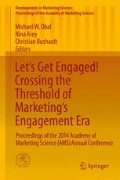Abstract
“The challenge of education is to prepare students for their future – not our past” – Anonymous
We have pioneered the area of subsistence marketplaces, creating unique synergies between research, teaching, and social initiatives (www.business.illinois.edu/subsistence). Distinct from relatively macro-level business approaches to poverty, (e.g., BoP), we adopt a micro-level approach to gain bottom-up understanding of life circumstances of subsistence consumer, entrepreneur and marketplace behaviors. The term, subsistence marketplaces, reflects understanding these contexts in their own right, not just as markets to sell to, but as individuals, communities, consumers, entrepreneurs, and marketplaces to learn from.
This program first led to a yearlong, innovative inter-disciplinary graduate-level course on sustainable product and market development for subsistence marketplaces with international immersion, offered since 2006–07. Students in business, engineering, industrial design and other areas spend the Fall semester understanding subsistence marketplaces through virtual immersion (poverty simulation, analysis of interviews of subsistence individuals, analysis of life circumstances in subsistence, development of conceptual models of poverty, needs, products, market interactions, and local environments) in this context and through emersion of business, design, and engineering principles. Interdisciplinary student groups work on organizational projects, generating and evaluating possible ideas for solutions to problems, and prepare for field research. The class travels for immersion in the context and to conduct market research during part of the winter break. Students observe households, marketplaces, and communities in urban and rural subsistence contexts and interview various stakeholders. A prototype and a comprehensive business plan are developed in the spring semester. This course sequence was ranked one of the top entrepreneurship courses by Inc. magazine in 2011, serving as a unique platform for bottom-up innovations for companies and social enterprises in 33 projects to date over 8 years. Insights from projects are being implemented by some sponsor enterprises and a student group has won a prestigious design award. Students earn a certificate in sustainability based on their accomplishments.
Based on this experience, we designed a module on developing sustainable businesses for subsistence contexts in a Business 101 course in 2007, then scaled for all incoming first semester undergraduate students (approximately 600). Since 2008, we also designed and offer Sustainable Marketing/Business Enterprises for first year MBAs focusing on environmental sustainability and business, with an online version for undergraduate students. We also designed and teach an executive MBA course on Global Business Horizons, focused on subsistence and sustainability since 2011, and a first semester course for undergraduate engineering students entitled Engineering for Global Development since 2012. Our curricular innovations have led to early exposure and later integrative experiences on subsistence and sustainability for undergraduate and graduate students and executives, which challenge them to confront radically different contexts and envision a better world. In 8 years, the Illinois business curriculum has been transformed, reaching almost 800 students annually. An eBook entitled Subsistence Marketplaces serves as an ideal text for this content area and created a web portal for educators around the world to disseminate materials and encourage curricular innovations in this area (day in the life videos, movie, multi-media immersion exercises, qualitative interviews, project reports). An online version of the course is reaching students around the world through Coursera, with the first iteration having close to 9,000 students.
In terms of educational philosophy, our curricular innovations challenge students to confront global problems and envision a better world, adopting a conception of business that focuses on finding win-wins between different dimensions of sustainability while acknowledging trade-offs, and emphasizing a pragmatic focus on doing sustainability. Our courses emphasize bottom-up innovation that inverts traditional top-down business planning and implementation to consider understanding and design of solutions that begin with the perspective of the end-user, the subsistence consumer or entrepreneur, the communities and the larger context. We emphasize bottom-up teaching approaches and numerous different ways of learning, such as through enabling students to connect the dots for themselves across the world through international immersion, the epitome of experiential learning experiences. Finally, our teaching is highly synergized with research and social initiatives, highlighting the close linkage between creation and dissemination of knowledge as well as public engagement.
Our work has had profound impact on businesses and social enterprises, business education, and subsistence populations, and has been multiplied by our work in social enterprise. We founded the Marketplace Literacy Project (http://www.marketplaceliteracy.org), designing and offering a unique marketplace literacy program in India, currently being scaled to reach large audiences using video-based approaches, with pilot efforts in other countries. Supplementing previous work on market access and financial resources, marketplace literacy enables subsistence consumers and entrepreneurs to adapt to changing marketplaces and engage in sustainable practices. Through this program, the discipline of Marketing reaching people who likely will never have access to a university. Grounded in fundamental Marketing notions of customer orientation, our work has led to pioneering innovations to address the global challenges of our generation that impact educators, students, and subsistence communities around the world.
Access this chapter
Tax calculation will be finalised at checkout
Purchases are for personal use only
Author information
Authors and Affiliations
Corresponding author
Editor information
Editors and Affiliations
Rights and permissions
Copyright information
© 2016 Academy of Marketing Science
About this paper
Cite this paper
Viswanathan, M. (2016). Curricular Innovations at the Intersection of Subsistence and Sustainability. In: Obal, M., Krey, N., Bushardt, C. (eds) Let’s Get Engaged! Crossing the Threshold of Marketing’s Engagement Era. Developments in Marketing Science: Proceedings of the Academy of Marketing Science. Springer, Cham. https://doi.org/10.1007/978-3-319-11815-4_3
Download citation
DOI: https://doi.org/10.1007/978-3-319-11815-4_3
Publisher Name: Springer, Cham
Print ISBN: 978-3-319-11814-7
Online ISBN: 978-3-319-11815-4
eBook Packages: Business and ManagementBusiness and Management (R0)

